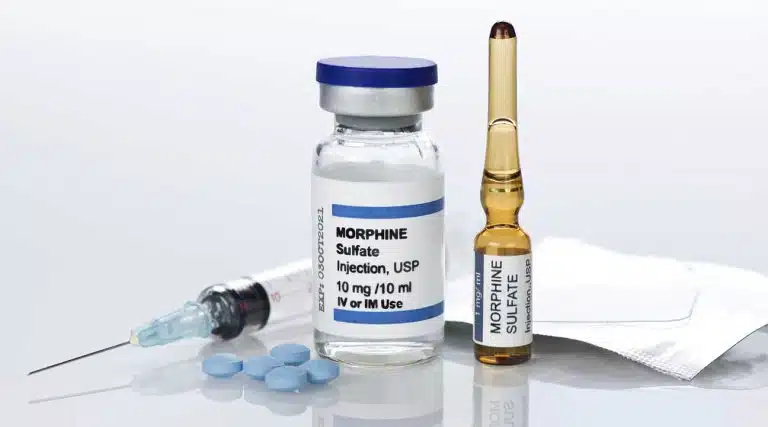Plugging, Snorting, Smoking, & Injecting Morphine | Dangers Of Morphine Abuse

Non-prescription morphine use is very dangerous due to the opiate’s high potential for addiction, overdose, and death. The variety of ways that this drug can be self-administered only increase the potential health risks and dangers involved in morphine abuse.
Morphine Background
In the United States morphine sulfate is a Schedule II non-synthetic opioid used for moderate to severe pain relief and chronic pain relief. However, today many newer synthetic and semi-synthetic opioid painkillers are used more frequently.
Morphine has been produced since the early 1800s in tablets, capsules, suppositories, oral solutions, and injection preparations.
The side effects of morphine generally involve sedation of the central nervous system and closely match the side effects of other opioid analgesics including hydrocodone, oxycodone, tramadol, and others. The sedating effects can lead to various methods of abuse.
Injecting Morphine
When oral morphine tablets are ingested via the mouth it takes time for the body to absorb the medication and attached to opioid receptors in the brain. This provides a more gradual, extended-release effect and high doses to get high.
By injecting the medication directly into the bloodstream, this time-delay process is bypassed so users can experience an immediate and far more intense high.
However, outside of medical use, morphine pills must be crushed and prepared for injection first.
The process of injection can lead to a variety of health risks, including:
- an elevated risk of overdose and death
- exposure to infectious diseases including HIV and Hepatitis B and C from non-sanitary needles
- skin infections, abscesses, and lesions due to poor sterilization technique
- track marks, or permanent scarring around injection sites
- rapid, severe morphine dependence and addiction
Smoking Morphine
Another option for morphine drug abuse involves preparing the tablets and heating them in tinfoil. After this, the vapors are inhaled and the drug enters the bloodstream through the lungs.
There is a misconception that smoking, snorting, or plugging opioids—including morphine—is a less addictive option compared to injection.
However, while it’s true that other forms of ingestion introduce the drug to the body more slowly than injection, that difference is relatively small and the drug remains just as addictive, dangerous, and habit-forming.
Smoking morphine can also cause a permanent reduction in lung function, lung irritation, and a buildup of unwanted morphine pill binder compounds in lung tissue.
Snorting Morphine
Snorting is a method of introducing morphine to the body through the mucus membranes of the nose and mouth. Pills are finely crushed and then inhaled, resulting in a very short delay before the effect kicks in.
However, as a person continues to snort drugs they will continuously damage their nasal structures leading to health effects such as:
- frequent, severe nose bleeds
- permanent loss of smell
- perforation of the nasal cavity (formation of a hole in the septum between your nostrils)
- perforation of the upper palate (formation of a hole in the top of your mouth)
Plugging Morphine
In a medical setting, morphine can be administered as a suppository in some cases. However, rectal administration greatly increases the bioavailability of morphine (the potency of the dose) compared to oral administration.
For this reason, although less common than other methods of abuse, there are individuals who choose to ‘plug’ morphine in order to get high.
Unfortunately, this increase in potency comes with significant health risks, especially without others nearby who can summon medical help if overdose occurs.
Risks of taking morphine via the rectum include:
- increased risk of seizure
- diarrhea
- constipation
- damage or death of rectal tissue
- decreased blood flow to the small intestine
- increased risk of overdose
Morphine Addiction Treatment
Addiction treatment centers exist to help drug users safely exit the cycle of opioid addiction. Substance abuse treatments and therapies that are available at our network of Massachusetts facilities include:
- medical detoxification to safely manage withdrawal symptoms
- behavioral therapy to help you change your thought process and feelings towards drug use
- inpatient treatment
- outpatient treatment
To learn more, contact Ark Behavioral Health or your healthcare provider today.
Written by Ark Behavioral Health Editorial Team
©2024 Ark National Holdings, LLC. | All Rights Reserved.
This page does not provide medical advice.
News Medical - Morphine History
Peer Based Harm Reduction WA - Alternative Routes of Administration
U.S. National Library of Medicine: MedlinePlus - Morphine


Questions About Treatment?
Ark Behavioral Health offers 100% confidential substance abuse assessment and treatment placement tailored to your individual needs. Achieve long-term recovery.
100% confidential. We respect your privacy.
Prefer Texting?
Our friendly support team is here to chat 24/7. Opt out any time.







 Learn More
Learn More








